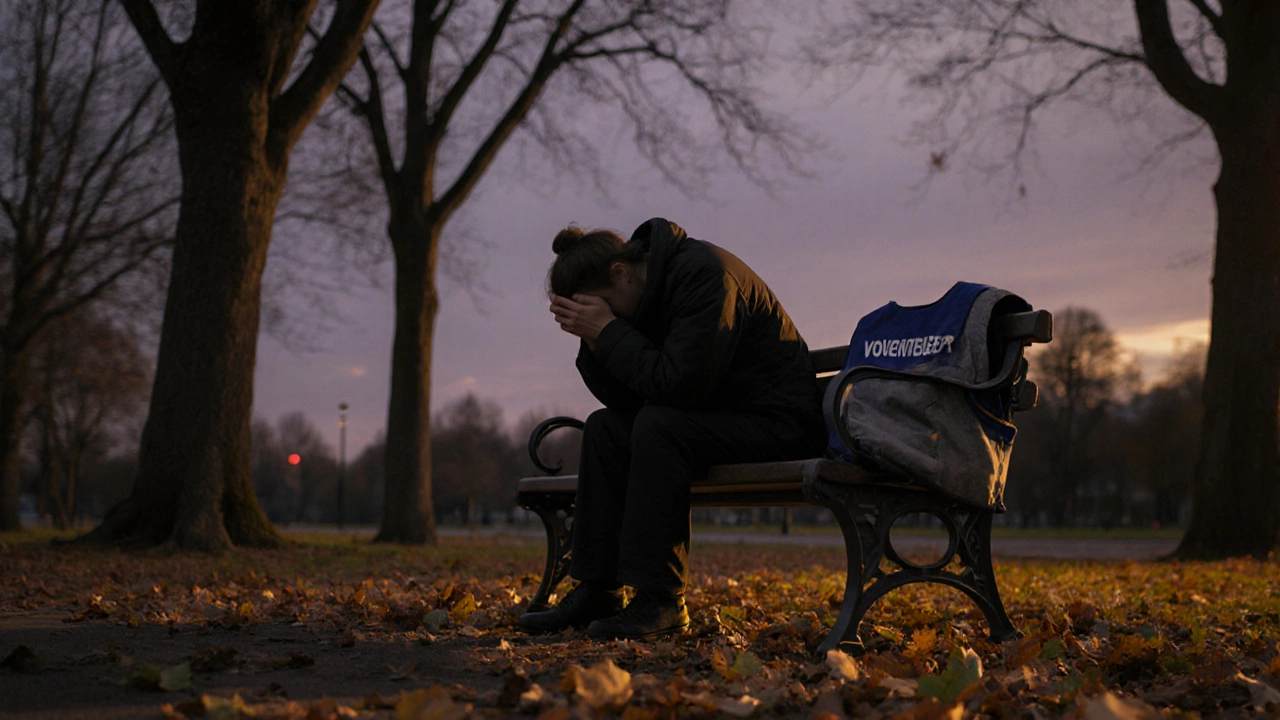Volunteer Burnout Assessment
How are you feeling about your volunteer work?
Take this short assessment to see if you're experiencing signs of volunteer burnout. This tool will help you recognize if it's time to step back and recharge.
What is volunteer burnout?
Volunteer burnout is when the emotional and physical demands of volunteering exceed your energy, causing exhaustion, reduced effectiveness, and negative feelings toward the volunteer role.
Signs include:
- Dreading volunteer shifts
- Feeling emotionally drained
- Losing interest in the cause
- Physical symptoms like headaches or sleep problems
You showed up every Saturday for months. You organized food drives, tutored kids after school, cleaned up parks, and stayed late to help with events. You felt good. You felt needed. But lately, you’re dreading Sunday nights. You’re snapping at your family. You’re canceling plans because you’re too tired. And when someone asks if you’re still volunteering, you pause-like you’re not sure anymore.
You’re not quitting because you don’t care
Most people who consider stopping volunteering aren’t lazy or selfish. They care deeply. That’s why it hurts to walk away. But caring doesn’t mean you have to give everything. Volunteering is supposed to help others-and you. If it’s draining you instead, it’s time to look at why.
A 2023 study by the Corporation for National and Community Service found that 42% of long-term volunteers reported emotional exhaustion after more than 18 months of consistent weekly service. That’s not weakness. That’s human. Your body and mind are signaling something’s off.
You’re saying yes because you feel guilty
Here’s a hard truth: you’re not the only one who can do this work. Organizations rely on volunteers, but they shouldn’t depend on one person to carry the load. If you’re staying because you’re afraid someone else won’t step up-or because you feel guilty saying no-you’re setting yourself up for resentment.
Think about it: if you quit, does the program collapse? Or does someone else pick it up? Most of the time, it’s the latter. But if you burn out, you lose your ability to help at all. And that’s worse for everyone.
You’re losing sleep, joy, or both
Volunteering should add to your life, not steal from it. Ask yourself these questions honestly:
- Do you look forward to your volunteer shift, or do you count the minutes until it’s over?
- Have you stopped doing things you used to love-reading, hiking, hanging out with friends-because you’re too tired?
- Are you sleeping less because you’re mentally replaying volunteer tasks, worrying about deadlines, or feeling overwhelmed?
If you answered yes to any of these, your volunteer role has crossed the line from meaningful contribution to emotional burden. That’s not sustainable. And it’s not helping the cause you care about.
You’re being asked to do things outside your role
Many volunteers get pulled into tasks they never signed up for. You started helping with tutoring, but now you’re managing budgets, handling donor calls, and fixing broken equipment. You didn’t agree to this. But you didn’t say no either.
That’s a red flag. Organizations often assume volunteers are flexible-and they’re right. But flexibility shouldn’t mean unlimited availability or accepting roles you’re not trained for. If you’re being asked to do things that stress you out, confuse you, or feel unfair, it’s not your job to fix their staffing problems.

You’ve lost your sense of purpose
At first, you felt like you were making a difference. Now, you show up because it’s what you’ve always done. That’s a quiet kind of burnout. It’s not dramatic. No one notices. But you feel it.
When volunteering stops feeling meaningful, it stops being volunteer work. It becomes a chore. And chores don’t change lives-not yours, and not the people you’re trying to help.
Take a step back. Ask yourself: What was the first thing that drew me here? Was it connecting with kids? Seeing the garden bloom? Helping someone find a job? If that spark is gone, it’s not time to quit forever. It’s time to change how you show up.
It’s okay to take a break
You don’t have to quit completely to stop volunteering. You can pause. You can reduce hours. You can switch roles.
Many organizations have volunteer roles that require just 2-4 hours a month. Maybe you can go from every Saturday to once a quarter. Maybe you help with one big event instead of weekly shifts. Maybe you mentor remotely instead of in person.
There’s no rule that says you have to give until you’re empty. In fact, the most effective volunteers are the ones who show up consistently-not because they have to, but because they want to.
How to step away without guilt
Saying goodbye to a volunteer role doesn’t mean you’re a failure. It means you’re responsible. Here’s how to do it with grace:
- Be honest, not apologetic. Say: “I’ve loved being part of this, but I need to step back for a while to focus on other parts of my life.”
- Offer to help transition. “I can train someone else or document what I’ve been doing.” This shows you care, even as you leave.
- Don’t over-explain. You don’t owe a 10-page essay on your mental health. A simple, clear reason is enough.
- Don’t burn bridges. Say thank you. Stay connected. You might come back later-on your terms.
People respect boundaries. They don’t respect burnout.

What to do after you stop
Stopping doesn’t mean you’re done helping. It means you’re resetting. Use this time to:
- Reconnect with friends and family you’ve missed
- Do something just for you-paint, walk, read, nap
- Reflect: What kind of volunteering would feel good again? Maybe it’s different now
- Consider a new role: shorter, less frequent, or completely different
Some people return to volunteering after a break and find they’re more present, more patient, and more effective. Others find they don’t want to go back-and that’s okay too.
Volunteering isn’t a moral obligation
Society tells us that good people give their time. That’s true. But good people also know their limits. Good people rest. Good people say no.
Volunteering is a gift. Gifts aren’t meant to be taken until they’re gone. They’re meant to be given with joy. If you’re not feeling joy anymore, it’s not the cause that’s failed. It’s the arrangement.
You don’t have to be the person who never says no. You just have to be the person who shows up-when you can, when you’re ready, and when it still feels right.
Is it selfish to stop volunteering?
No. It’s self-aware. If you’re exhausted, resentful, or overwhelmed, continuing won’t help anyone. Organizations need volunteers who are present and energized-not those who are running on empty. Stepping back so you can come back stronger is the opposite of selfish.
What if no one else steps up when I leave?
That’s a common fear, but it’s rarely true. Most organizations have more volunteers than they realize, and many are waiting for someone to make space. If you’re the only one doing a task, it’s likely because no one else was asked-or they didn’t know they could. Your leaving might be the push the organization needs to recruit better and distribute work fairly.
How long is too long to volunteer?
There’s no set timeline. What matters is how you feel. Some people volunteer for years without burnout. Others need to switch every 6 months. Pay attention to your energy, your mood, and your relationships-not the calendar. If you’re losing sleep, joy, or connection with people you care about, it’s time to adjust-even if it’s only been a few months.
Can I volunteer again later?
Absolutely. Many people return to volunteering after a break-sometimes years later. They come back with new skills, fresh energy, or a different perspective. Organizations welcome back volunteers who’ve taken time to recharge. Your history with them matters, but your well-being matters more.
I feel guilty for wanting to stop. Is that normal?
Yes. Guilt is common because we’re taught that helping others is a moral duty. But helping yourself isn’t selfish-it’s necessary. If you’re not okay, you can’t help others sustainably. Feeling guilty doesn’t mean you’re wrong. It means you care. And that’s why you’ll make the right choice for yourself and the cause.
Final thought
You didn’t start volunteering to burn out. You started because you wanted to make a difference. That’s still true. But the difference you make isn’t measured by how many hours you give-it’s measured by how much heart you bring. And heart needs rest.
